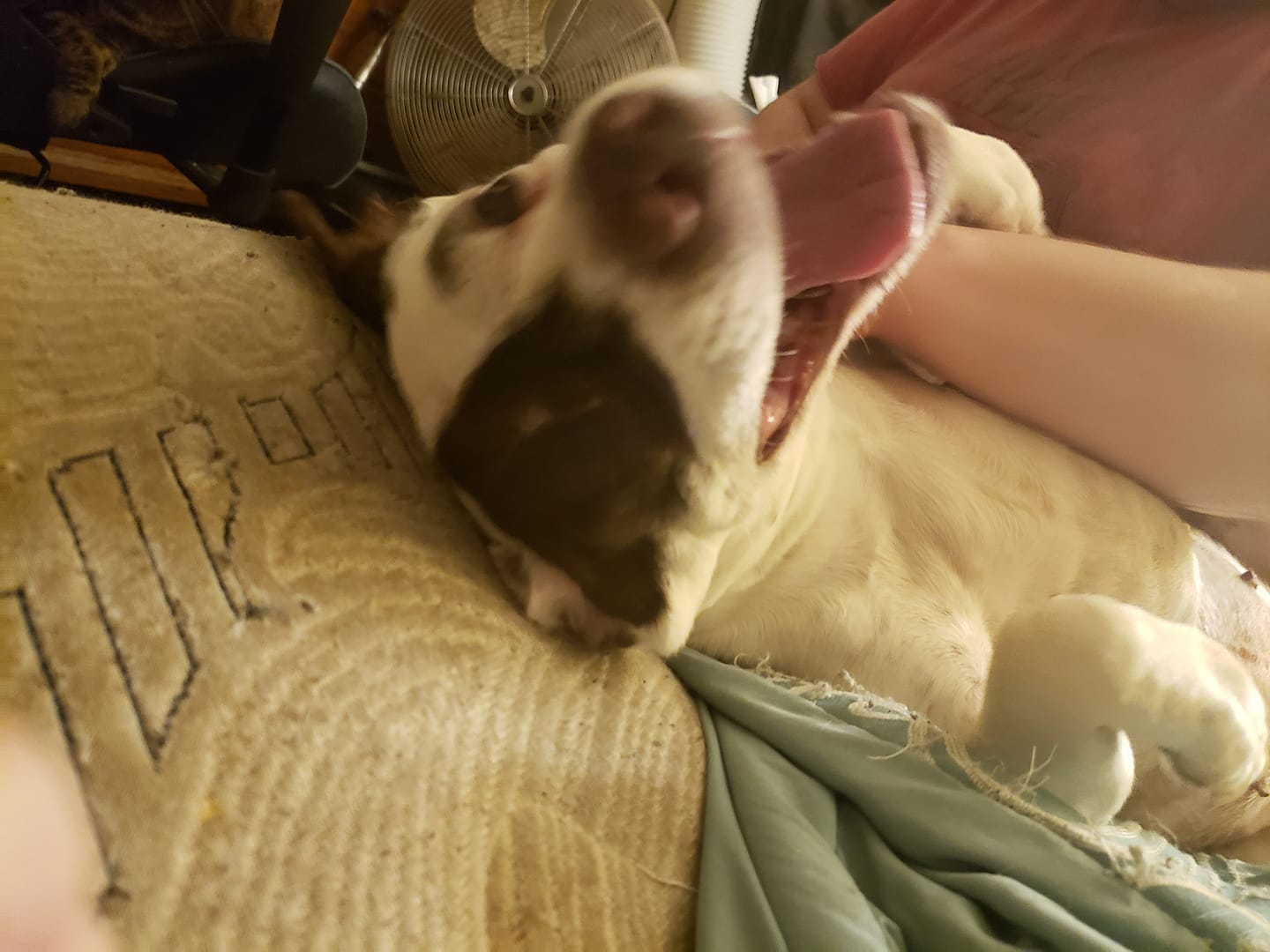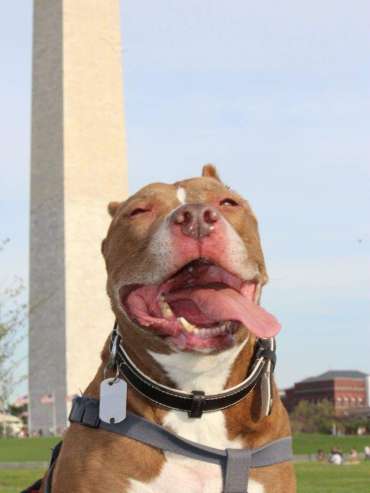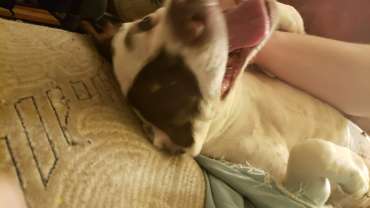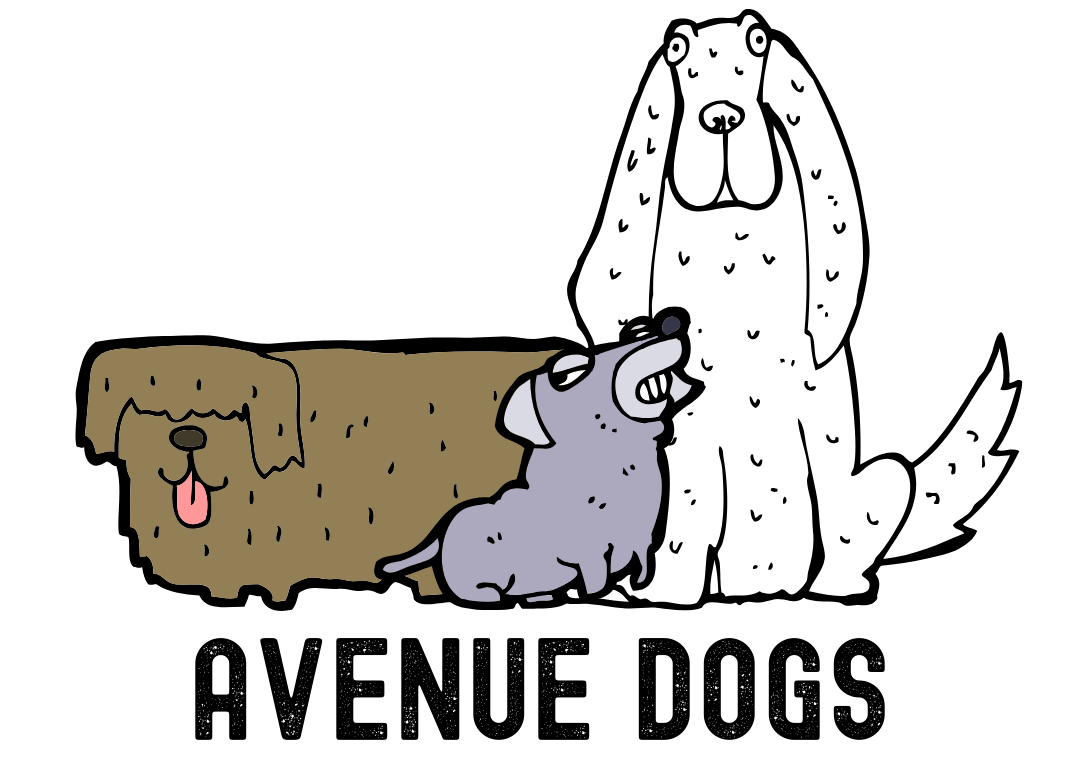


Is dog dental cleaning really necessary? You’d be surprised to learn just how important it actually is to your pup’s overall quality of life. Some dogs enjoy a good teeth brushing, while others need a little more coaxing. Here, you’ll earn the ins and outs of taking care of your dog’s teeth at home.
Too often pet parents overlook the importance of dental health when it comes to their canine companions. Vets agree, however, that good dental hygiene can prevent dental disease, which can lead to more serious health conditions. Maintaining healthy teeth and gums benefits more than just your dog’s dental health; it contributes to their overall health and well-being.
Preventing Dental Disease in Dogs
Lack of canine dental care can contribute to periodontal disease (gingivitis), which causes inflammation of the gums. Poor dental hygiene can lead to more than just bad breath, tooth loss, and broken teeth.
Without proper care and attention, problems in your dog’s mouth can cause damage to their kidneys, liver, and heart muscle. In fact, many of the more serious health problems in dogs can be traced to their gums and teeth.
If you aren’t already paying attention to your dog’s dental health, keep reading for tips on how to take care of your pup’s smile and prevent more serious conditions. So, is dog dental cleaning necessary? Absolutely.
What Can I Brush my Dog’s Teeth With?



The easiest way to take good care of your dog’s teeth is by regular brushing. Common symptoms of dental problems are bad breath, excessive drooling, and loss of appetite. Starting a regular dental care routine should also include checking for these early signs of dental problems.
Cleaning your pet’s teeth with the wrong methods/tools can be just as bad, or worse than not brushing their teeth at all. A frequent question we get as pet professionals is “what can I brush my dog’s teeth with?” Don’t worry. We’ve got you covered.
You should never use human toothpaste to brush your pet’s teeth. Toothpaste specifically designed for dogs is non-foaming, safe to swallow, and available in dog-friendly flavors. Many of them also contain enzymes designed to break down plaque chemically, which reduces the amount of time you have to spend brushing your dog’s teeth.
Human toothpaste contains ingredients that should not be swallowed (by dogs or humans) and may cause internal problems if swallowed by your dog.
Baking Soda for Dog’s Teeth: A Major No-No
You might think about using baking soda to clean your dog’s teeth as a cost-saving option. However, if swallowed, baking soda can upset the acid balance in your dog’s stomach and digestive tract.
How to Clean Your Dog’s Teeth?
The following tips will guide you in brushing and removing plaque from your dog’s teeth:
- First and foremost, make sure that your dog feels comfortable
- Create a calm and relaxed atmosphere before beginning to brush
- Touch your dog’s gums and teeth without the brush at first
- Apply a bit of toothpaste to your fingers and introduce the toothpaste to your dog by letting your dog lick it
- Add toothpaste to your brush and begin brushing
- Begin slowly and move from the front to the back, and from the top to the bottom
- Reward and praise your dog as you go
If you’re still uncomfortable or unsure how to clean your dog’s teeth, you can always schedule an appointment with your vet. They’ll happily show you the ins and outs of the process, making you feel more comfortable doing it regularly at home.



Frequency of Brushing: How Often Should You Do It?
The foundation of good oral health is brushing teeth frequently. After your dog begins to tolerate you brushing their teeth, try to brush them once a day to be most effective. By brushing your dog’s teeth once a day, you’ll be reducing future dental cleanings and vet visits later on.
Daily teeth brushing may seem a little excessive, but it’s an important part of their overall health. Ask any vet “is dog dental cleaning necessary?” and you’ll be sure to get an earful. After all, you wouldn’t skip a day brushing your own teeth, would you?
Dog Teeth Cleaning Products & Toys



Toys aren’t only great ways for your dog to relieve their boredom, it’s also a great way for them to satisfy their instincts to chew. Not only that, but by your dog gnawing on chew toys – they’ll naturally be cleaning their teeth as the chew toy will be scraping away the plaque from their teeth. Make sure to monitor and rotate chew toys to maintain safety.
Opting for specially-designed dog teeth cleaning products can lead to better breath, plaque removal, and cavity prevention.
Don’t Be Afraid to Call in Reinforcements
We discussed earlier how important good dental care is for your family dog, but what if your dog doesn’t let you brush its teeth? In this case, you can try offering them homemade pet food, dental treats, or dental toys. If they refuse that, the next step is to call for professional help.
A dental exam with your vet can confirm whether a dental cleaning is necessary. If a dental cleaning is deemed necessary, the next step is determining whether your dog’s kidney and liver function are satisfactory for anesthesia. Since anesthesia is important for the vet to conduct a tooth-by-tooth examination, evaluating whether your dog’s overall health is fit enough for the procedure is crucial.
Reasons Canine Dental Health Is So Important
Is dog dental cleaning necessary? Absolutely. Here’s why:
#1 Prevent Tooth Loss



By prioritizing your dog’s dental care, you will be maintaining the strength and health of their teeth. Resulting in your dog’s teeth staying in place, which makes it easier for them to eat, chew, and play. Otherwise, their teeth structures can become infected or damaged.
#2 Prevent Bad Breath



Have you ever gotten a nasty whiff of your dog’s bad breath? Then that’s a clear sign that their teeth are experiencing bacteria build-up due to poor dental health. By regularly cleaning your dog’s teeth you will be preventing that nasty odor from developing.
#3 Prevent Periodontal Disease



Gingivitis is the first phase of gum disease. The cause of gingivitis is gum infection and inflammation – which is due to tartar that’s left on your dog’s teeth. After some time, Gingivitis can develop into periodontal disease – which can be quite dangerous.
#4 Prevent Pain



By maintaining the health of your dog’s teeth and gums, you can prevent your dog from being in oral pain. Otherwise, they may experience mood changes and not want to eat.
A few of the signs of dental disease include:
- Drooling
- Loose teeth
- Broken teeth
- Bleeding or painful gums
- Refusal to drink or eat
#5 Prevent Organ Damage



Bacteremia is the result of bacteria that causes plaque – which can enter the bloodstream. Once bacteria begins to travel through the body, it begins spreading to organs like the kidneys, liver, and heart. By focusing on your dog’s dental care, you can keep your dog healthy and happy!
The Importance of Canine Dental Care



Dental health is an important part of our dog’s overall health. Dental problems can be caused by or cause other health problems. You should get your dog’s teeth and gums checked by your veterinarian at least once a year.
Dental problems can cause a lot of pain in our dogs, as well as a drain on our wallets. We hope this article has shown you the importance of canine dental care – including both their teeth and gums. Don’t wait. Create a dental hygiene routine with your pup today so you can enjoy their smile for years to come!
Emily is a writer who travels full-time in a converted school bus (aka skoolie) with her 5 year old lab mix, Eliot. She is passionate about sustainability and making healthy lifestyle changes. Emily enjoys hiking and exploring the country with Eliot.

1 Comment
Howard
Hey there! This is my first visit to your blog! We are a group of volunteers and
starting a new initiative in a community in the same niche.
Your blog provided us valuable information to work on. You have done a outstanding job!